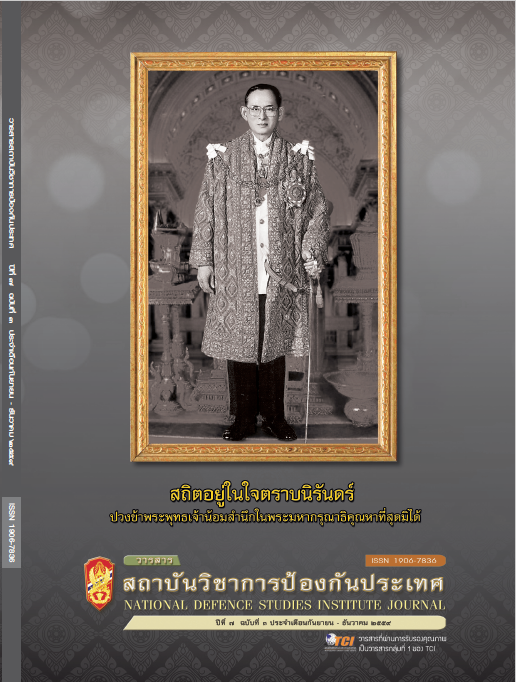แนวทางการสร้างความร่วมมือในการต่อต้านภัยคุกคามไม่ตามแบบ ระหว่างราชอาณาจักรไทย ราชอาณาจักรกัมพูชา และสาธารณรัฐสังคมนิยมเวียดนาม: กรณีศึกษา เส้นทางเชื่อมต่อระหว่างสระแก้ว – พนมเปญ - โฮจิมินท์
Main Article Content
Abstract
บทคัดย่อ
การวิจัย เรื่อง “แนวทางการสร้างความร่วมมือในการต่อต้านภัยคุกคามไม่ตามแบบระหว่างราชอาณาจักรไทย ราชอาณาจักรกัมพูชา และสาธารณรัฐสังคมนิยมเวียดนาม: กรณีศึกษา เส้นทางเชื่อมต่อระหว่างสระแก้ว – พนมเปญ - โฮจิมินท์” โดยมีวัตถุประสงค์เพื่อศึกษากลไก และกรอบความร่วมมือในการต่อต้านภัยคุกคามไม่ตามแบบระหว่าง ราชอาณาจักรไทย และประเทศเพื่อนบ้าน ตลอดจนปัจจัยที่ส่งผลต่อความร่วมมือในการต่อต้านภัยคุกคามไม่ตามแบบระหว่างประเทศ เพื่อเป็นข้อเสนอแนะเชิงนโยบาย และแนวทางปฏิบัติเพื่อส่งเสริมความร่วมมือในการต่อต้านภัยคุกคามไม่ตามแบบระหว่างราชอาณาจักรไทย และประเทศเพื่อนบ้านที่อยู่บนเส้นทางเศรษฐกิจสาย Southern Economic Corridor
ผลการวิจัย พบว่า รูปแบบของภัยคุกคามความมั่นคงไม่ตามที่เกิดขึ้นในพื้นที่เป็นภัยที่มีลักษณะข้ามชาติไม่ได้เกิดในประเทศไทยเพียงประเทศเดียวแต่ผลกระทบที่เกิดขึ้นมีต่อประเทศไทยสูงในบางเรื่อง ซึ่งเป็นผลจากลักษณะของแต่ละพื้นที่ และประเทศเพื่อนบ้านที่เผชิญปัญหาที่แตกต่างกันไป ดังนั้น ปัญหาเหล่านี้จึงไม่สามารถที่จะแก้ไขที่ประเทศใดประเทศเดียวและด้วยกลไกของประเทศที่เป็นภาครัฐอย่างเดียวเท่านั้น จึงเกิดช่องว่างที่การศึกษาฉบับนี้เสนอให้มีการใช้ความร่วมมือกับภาคเอกชนและภาคประชาสังคมมามีส่วนร่วมในความร่วมมือเพื่อต่อต้านกับปัญหาดังกล่าว และความร่วมมือระหว่างประเทศตามเส้นทางการศึกษาเป็นความร่วมมือในระดับทวิภาคี ระหว่างประเทศนอกเหนือจากกรอบของอาเซียน เพราะประเทศที่ติดกันยังมีปัญหาที่อ่อนไหวระหว่างกัน เช่นอธิปไตยเหนือดินแดน ความแตกต่างของการปกครองและระบบกฎหมายภายในของแต่ละประเทศ
ปัญหาที่พบในปัจจุบันในพื้นที่ศึกษา ได้แก่ แรงงานผิดกฎหมาย-การลับลอบเข้าเมือง ยาเสพติด การทำลายทรัพยากรธรรมชาติ การค้ามนุษย์ และสินค้าหนีภาษี ซึ่งงานวิจัยฉบับนี้ให้ความสำคัญกับสามปัญหาหลักที่เกิดขึ้นมากในพื้นที่คือ ปัญหาแรงงานผิดกฎหมาย ยาเสพติด และ การทำลายทรัพยากรธรรมชาตินำมาศึกษาต่อถึงกลไก กระบวนการ การพัฒนาความร่วมมือและผู้แสดง (Actors) ในการแก้ปัญหาดังกล่าว และเมื่อลงพื้นที่ศึกษาตามเส้นทางที่ผ่านกัมพูชา และเวียดนามนั้น ทั้งสองประเทศมองปัญหาที่แตกต่างจากไทย กัมพูชามองปัญหาธรรมชาติ ความแห้งแล้ง/การขาดแคลนน้ำ เช่นเดียวกับเวียดนามก็ให้ความสำคัญกับปัญหาทรัพยากรน้ำจากแม่น้ำโขง และปัญหาอิทธิพลจากชาติมหาอำนาจในพื้นที่มากกว่าของไทย แสดงให้เห็นถึงการเคลื่อนของปัญหา ต่อความมั่นคงที่ส่งผลต่อความมั่นคงระดับประเทศ(National Security) สู่การให้ความสำคัญของปัญหาที่ส่งผลในระดับความมั่นคงของมนุษย์(Human Security) มากขึ้นและที่สำคัญอิทธิพลชาติมหาอำนาจที่ผ่านนโยบายเศรษฐกิจ ที่จะส่งผลกระทบต่อเสถียรภาพของประชาชนและประเทศในระยะยาว
คำสำคัญ
การสร้างความร่วมมือ, การต่อต้านภัยคุกคามไม่ตามแบบ, ไทย - กัมพูชา – เวียดนาม, สระแก้ว – พนมเปญ – โฮจิมินท์, SEC, Southern Economic Corridor.
Abstract
The research, namely, “Integrated Approach for Cooperation on Non-Traditional Securi-ty Threats between Thailand – Cambodia – Vietnam: the connecting route between Sa Kaeo – Phnompenh – Ho Chi Minh” has primary objectives in studying mechanisms and cooperation within the areas of Non-Traditional Threats between Thailand and neighboring countries, in-cluding influential factors involved. The results hopefully are beneficial to formulations of re-lated policies for the Thai government, or, possibly other related entities, especially for those within the Southern Economic Corridor.
The results show that Non-Traditional Security Threats (NTS) usually do not only oc-cur in Thailand alone, but they are quite often transnational, which involve many countries within the region sharing the same borders. However, in many cases, there appear to have high impacts on Thailand. And, it is widely accepted that no single country can handle these NTS problems solely nor effectively. Therefore, this research is designed to find better ways to alleviate the problems. After the study, it is suggested that the problems could be han-dled better with joint efforts among all parties involved, not just the government, but, includ-ing civilian sectors, Non-Governmental Organizations, the society, and the people. Also, there are needs for bilateral cooperation, or even enhancing cooperation with other nations outside ASEAN, if needed. Outside cooperation may be hugely useful because of existing weaknesses within the regional ASEAN countries in their own unsettled border disputes, sovereignty issues, different systems of governance, and limitations due to each one’s internal laws.
The NTS problems found during the study are illegal migrant workers and illegal entry, drugs, violations of protected natural resources, human-trafficking, and taxes evasions for cross-border goods. However, this study emphasized on the three problems which are illegal migrant workers and illegal entry, drugs, and violations of protected natural resources; espe-cially, the efforts in solving the problems by their processes, mechanisms, development of cooperation, and key actors. It is also found, along the route between Thailand – Cambodia – Vietnam, that each country views the NTS problems differently according to one’s own prob-lems and perspectives. For example, Cambodia worries more about draught and water-shortages, but, Vietnam worries more about over-utilizing of water resources from the Me-kong river, also, about influences from major Super Powers coming into the region. It is worth noticed that, increasingly, the problems may have migrated or expanded from National Securi-ty issues to be Human Security issues. Moreover, Super Powers may increasingly assert their influences through their economic policies, effecting people and the regional countries, in their long-term stability.
Keywords
Cooperation Development, Non-Traditional Security Threats, Thailand – Cambodia – Vietnam, Thailand – Cambodia – Vietnam : the connecting route between Sa Kaeo – Phnompenh – Ho Chi Minh
Article Details
The articles, images, tables, graphs, written content, and opinions published in this journal are solely those of the authors and do not necessarily reflect the views or positions of the National Defence Studies Institute or its academic affiliates.


